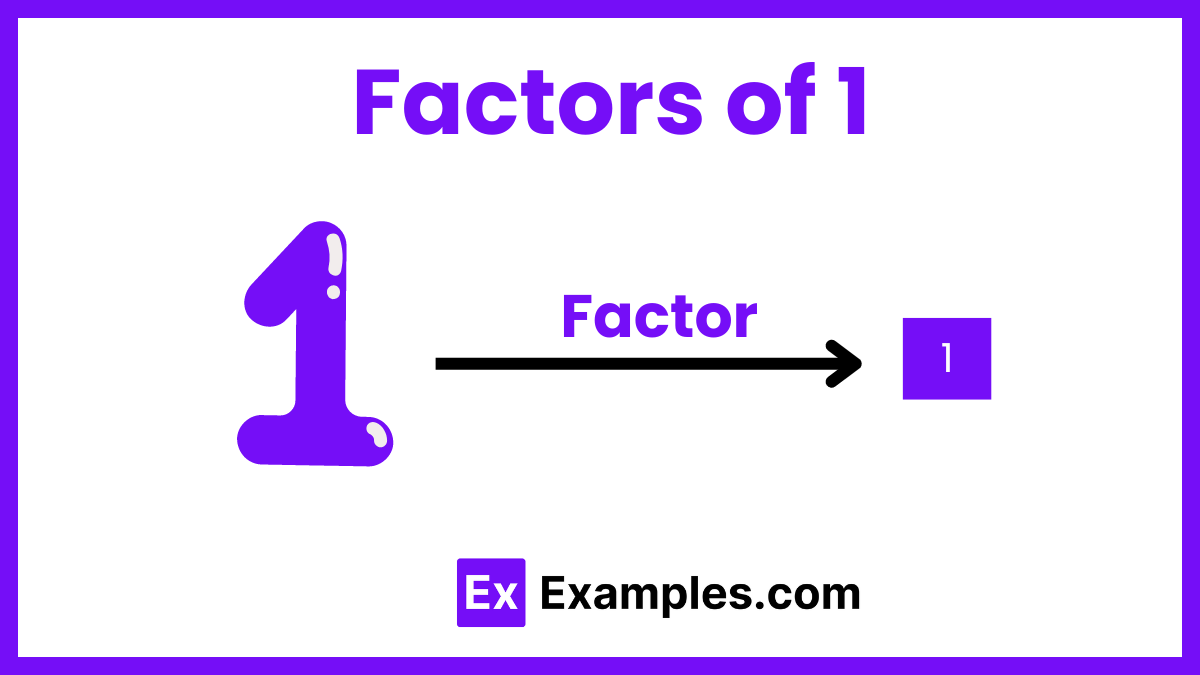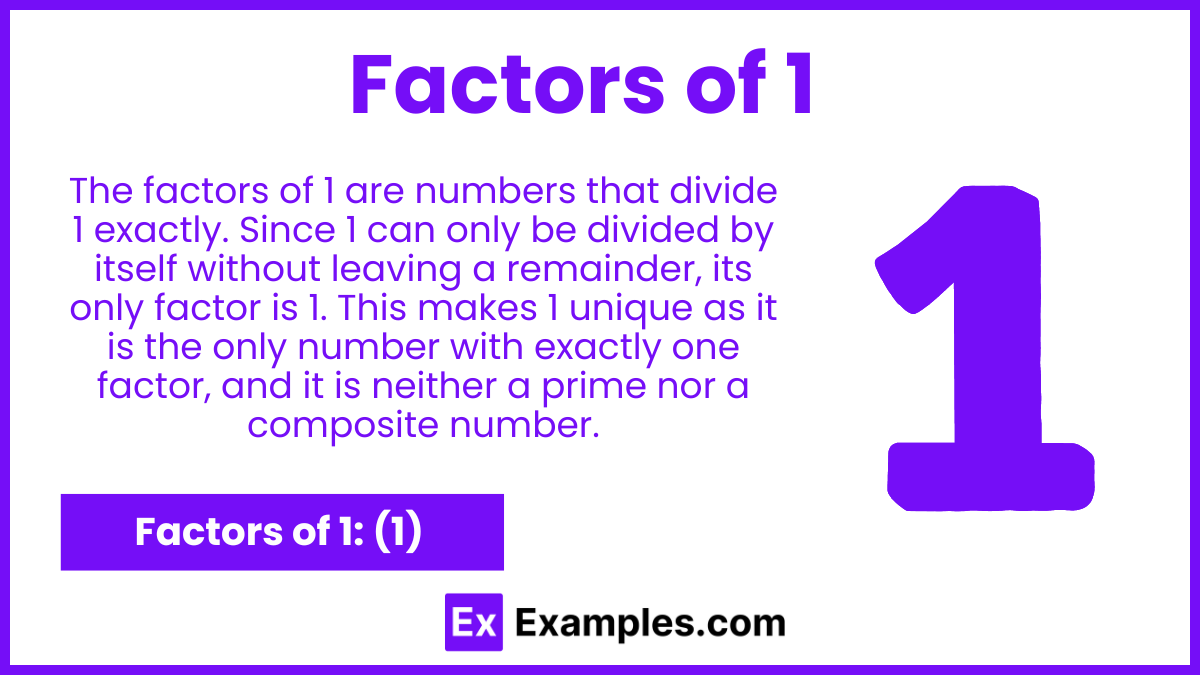Factors of 1, Prime Factors of 1, How to Calculate, Tips
The factors of 1 are unique in mathematics because 1 has only one factor: itself. Unlike other numbers, which have multiple factors, 1 is the only number that is its own factor. This uniqueness makes 1 a special case when studying factors and divisors. Understanding the factors of 1 is fundamental in number theory and helps in grasping basic mathematical concepts. Since 1 can only be divided evenly by 1, it is neither prime nor composite. This simplicity makes 1 an essential building block in the study of mathematics and its applications.
Factors of 1: The only factor of 1 is 1 itself.
Negative Factors of 1: The only negative factor of 1 is -1.
Prime Factorization of 1: 1 has no prime factors, making prime factorization inapplicable.
Sum of Factors of 1: The sum of all factors of 1 is 1.
What Are the Factors of 1?

- The number 1 has only one factor, which is 1 itself. This means it can only be divided evenly by 1.
- 1 is neither a prime number nor a composite number because it does not meet the criteria for either category.
- 1 is known as the multiplicative identity because any number multiplied by 1 remains unchanged.
- This simplicity makes 1 a special and fundamental number in mathematics, with unique properties.
- In arithmetic operations, 1 serves as a neutral element for multiplication, maintaining the value of any number it multiplies.
- The uniqueness of 1 having only one factor distinguishes it from all other natural numbers, highlighting its singularity in mathematical concepts.
Factors of 1 in Pairs
When discussing factors in pairs, we typically look for two numbers that multiply together to give the original number. For the number 1, the factor pair is quite simple:
- 1 × 1 = 1
Since 1 is its only factor, the only factor pair of 1 is (1, 1). This highlights the unique nature of 1 in mathematics, as it is the only number that is both a factor and a pair to itself.
How to Calculate Prime Factors of 1
The concept of prime factors applies to integers that are divisible by prime numbers other than themselves. Prime factors are the prime numbers that, when multiplied together, yield the original number.
Prime Factorization of 1:
- Definition of Prime Numbers: Prime numbers are numbers greater than 1, with exactly two distinct positive divisors: 1 and the number itself.
- Factorization Requirements: To find the prime factors, the number must be divisible by at least one prime number.
- Special Case of 1: Since 1 is not greater than 1, it has no prime factors. The number 1 does not meet the basic criterion to have prime factors because it is not divisible by any prime number.
Factors of 1 : Examples
Example 1: Division
- You have 10 apples and you want to divide them equally among 1 person.
- Calculation: 10÷1=10
- Explanation: Dividing any number by 1 always gives the original number. Here, dividing 10 by 1 results in 10.
Example 2: Multiplication
- You buy 1 pack of 15 pencils.
- Calculation: 1×15=15
- Explanation: Multiplying any number by 1 always gives the original number. Here, multiplying 15 by 1 results in 15.
Example 3: Simplifying Fractions
- You have a fraction 7/1
- Calculation: 7/1=7
- Explanation: Any fraction with 1 as the denominator simplifies to the numerator.
Example 4: Multiplicative Identity
- You want to check the identity property of multiplication.
- Calculation: 23×1=23
- Explanation: The identity property states that any number multiplied by 1 remains unchanged. Here, 23 multiplied by 1 remains 23.
Example 5: Exponentiation
- You raise any number to the power of 1.
- Calculation: 9¹=9
- Explanation: Any number raised to the power of 1 is the number itself. Here, 9 raised to the power of 1 remains 9.
Factors of 1 : Tips
- Unique Factor: 1 is unique because it only has one factor, which is itself.
- Not Prime: 1 is not considered a prime number because it does not have exactly two distinct factors (1 and itself).
- Not Composite: 1 is also not considered a composite number because it does not have more than two factors.
- Universal Factor: Any number divided by 1 equals itself, making 1 a universal factor for all numbers.
- Simplifies Math: The simplicity of 1 having only one factor makes it useful in simplifying mathematical concepts and problems.
- Multiplicative Identity: In multiplication, 1 is known as the multiplicative identity because any number multiplied by 1 remains unchanged.
- Foundation of Number Theory: Understanding the factor of 1 is fundamental in number theory and helps in grasping more complex concepts.
- Role in Fractions: In fractions, dividing by 1 leaves the fraction unchanged, which is a useful property in simplifying and comparing fractions.
FAQS
How many factors does the number 1 have?
The number 1 has only one factor: itself. It is unique in this regard, as no other numbers divide 1 without a remainder.
Why is 1 the only factor of itself?
1 is the only factor of itself because it is the multiplicative identity in mathematics, meaning any number multiplied by 1 will result in that same number. Thus, only 1 can divide 1 evenly.
Is 1 considered a prime number?
No, 1 is not considered a prime number. A prime number is defined as a number greater than 1 that has exactly two distinct positive divisors: 1 and itself. Since 1 only has one divisor, it does not meet the criteria for a prime number.
Can 1 be a factor of other numbers?
Yes, 1 is a factor of every number. Since multiplying any number by 1 results in that number, 1 divides all numbers without leaving a remainder, making it a universal factor.
What role does 1 play in division?
In division, 1 serves as an identity element. Dividing any number by 1 leaves the original number unchanged, demonstrating the unique property of 1 in division operations.
How many factors of 1 are there?
There is only one factor of the number 1, and that is 1 itself. It is the only number that divides 1 exactly without any remainder.
What are multiple factors of 1?
The number 1 does not have multiple factors; it only has one factor, which is the number 1 itself.


